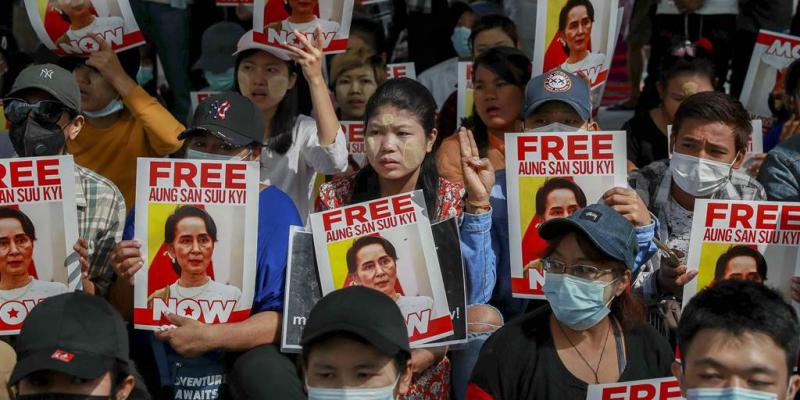Facebook bans Myanmar military from its platforms as violent protests continue



Facebook on Thursday said it had banned the Myanmar military from using its platforms with immediate effect, as weeks of mass demonstrations continue in the Southeast Asian country after the military seized power.
"Events since the February 1 coup, including deadly violence, have precipitated a need for this ban," Facebook said in a blog post. "We believe the risks of allowing the Tatmadaw (Myanmar army) on Facebook and Instagram are too great."
The army seized power this month after alleging fraud in a Nov. 8 election swept by Aung San Suu Kyi's National League for Democracy (NLD), detaining her and much of the party leadership.
At least three protesters and one policeman have been killed in violence at rallies.

Thousands march through Yangon's streets to protest Myanmar coup
The U.S tech giant said it would also ban all "Tatmadaw-linked commercial entities" from advertising on its platforms.
It said the decision to ban the Myanmar army came due to "exceptionally severe human rights abuses and the clear risk of future military-initiated violence in Myanmar", as well as the army's repeated history of violating Facebook's rules, including since the coup.
The military government could not immediately be reached for comment.
Meanwhile, members of a group supporting Myanmar's military junta attacked and injured people protesting in Yangon Thursday. At least several people were injured in the attacks in Myanmar's largest city.
Photos and videos on social media showed the attacks and injured people in downtown Yangon as police stood by without intervening. The attackers fired slingshots and carried iron rods, knives and other sharp implements.
Facebook is widely used in Myanmar and has been one of the ways the junta has communicated with people, despite an official move to ban the platform in the early days of the coup.
Facebook in recent years has engaged with civil rights activists and democratic political parties in Myanmar and pushed back against the military after facing international criticism for failing to contain online hate campaigns.
Facebook plays an outsized role in Myanmar, where for many residents it is synonymous with the internet. United Nations investigators say that Facebook allowed the platform to be used by radical Buddhist nationalists and members of the military to fan a campaign of violence towards the Muslim Rohingya minority, 700,000 of whom fled an army crackdown in 2017. I
The junta has tried to block Facebook and other social media platforms since taking power, but its efforts have proven ineffective. For more than a week it has also turned off access to the internet nightly from 1 a.m.
The military says it took power because last November's election was marked by widespread voting irregularities, an assertion that was refuted by the state election commission, whose members have since been replaced.
The junta has said it will rule for a year under a state of emergency and then hold fresh elections.
Reuters




It's a start.